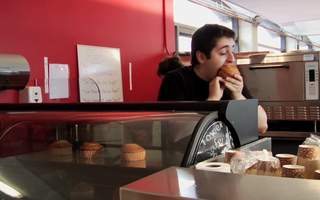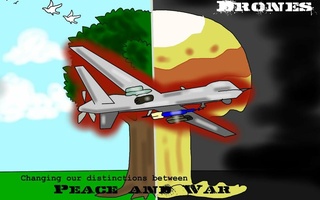Adzope is one of a score of drab, sprawling towns which you pass on the Ivory Coast's main highway north of Abidjan. The West African countryside is absolutely flat, and in the thick coastal forest the town is invisible until a turn in the road brings you into the center. Then suddenly the wall of the trees opens up, and there is a glimpse of long dirt roads, gas station signs and telephone poles, laundry spread out on the grass to dry, and people walking past rows of identical shops stacked with bright plastic washtubs. The reflection of the equatorial sun is painful. Round another bend, the trees close together again, and the view is all woods and vines for ten miles more.
Adzope happens to be a little bigger and richer and more important than most of the other towns. It prides itself as an important center for cocoa, coffee, and bananas. MG trucks load up in the surrounding forest with giant teak and mahogany logs for the export market. The town is the administrative seat for the surrounding sous-prefeture--a government unit including about 65,000 people. There are four sizable schools, bureaucratic offices, chain stores, a post office.
This means prosperity, here, and Adzope's dullness does not hide all the signs of its relative affluence. The local delegate to the Assemblee Nationale has a chauffered Mercedes, and dozens of people buzz around on Mobylettes.
But the fact of Adzope's is its ugly plainness, its disorganization. Drivers on the highway drive by, heading either for Abidjan's stores and skyscrapers or for the upcountry north for a look at wild Africa. This isn't worth a stop--it's too dirty to be sophisticated and too civilized to be picturesque.
But Adzope, or the hundred towns like it, is going to be far more crucial to the development of the Ivory Coast than the capital or the villages. The capital, Abidjan, everyone there says, is beautiful, but no more African than Marseille. The glamor of the villages quickly becomes boring--progress avoids them. The success or failure of the country will be decided outside both areas: outside Abidjan because it is such an anomoly, outside the villages because nothing ever happens there.
Political and social development, then, revolves around the Adzopes all over West Africa, the countless ugly towns of 15 or 20,000 people.
The writer spent last summer working in the Ivory Coast with Operations Crossroads.
That seems a hopeless place to start, with such disorganization. It is hard for a visitor to try to resolve any pattern in daily life, any sign that people care about the country, or the government, or any kind of unit bigger than a family. Adzope has the accouterments of civilization, but that often appears very irrelevant. It has had enough French education to be able to go through the motions, but occasionally something happens to show how thin the veneer really is.
On the eve of Independence Day, August 7, the sous-prefet held a buffet dinner for all the important people in town. Everyone showed up in his best, either a suit or an ornate robe, and chatted pleasantly or danced during cocktails. Then a servant came out to announce that dinner was ready, and instantly the place was transformed. People jammed through the door, shoving each other out of the way to get in, shoveling enough food onto their plates to last the week. Last man got nothing.
Is the whole act of modernization just that: an act. It seems that way, at times like the sous-prefet's party or times when a traveler is randomly rounded up by the police. Then Adzope appears shapeless, with its bits and pieces acting out their meaningless Western jobs under no particular plan.
Finding any organization here is a gradual process. People passing through almost never do it. But there is organization here, and eventually some of it becomes clear.
Nationalities show up most quickly. Most of Adzope is African, of course, but the people have surprisingly wide backgrounds. The Ivory Coast itself counts some 64 dialects, and different quartiers in town speak different languages. Economic prosperity has drawn settlers from poorer neighbors to the north--Mali, Niger, and Guinea.
There is a sizeable white community, too. The French, who ruled the country until seven years ago, are still around. Most of them are priests, doctors, technical advisers, or teachers at the secondary schools; mostly they stick to themselves and save up to go back to France during the summer vacations. They are guests of honor at all official functions, but they have long ago abdicated from any influence on the way Adzope is going.
The Lebanese are everywhere, and they all do the same thing: operate identical general stores with identical merchandise. Adzope has an even dozen Lebanese stores, and if you can't find something in one of them you can't find it anywhere. They sell to the Africans and leer at the French women, but no one talks to them except other Lebanese.
Since the Peace Corps, a few Americans, Canadians, and scattered other nationalities have come upcountry. Adzope had four volunteers this summer, who taught or traveled to outlying villages giving health lectures, advising mothers, and administering vaccinations. The unmarried Frenchmen date the girls, but they're lonely too.
Read more in News
King Honored at Student Breakfast

















